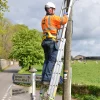Waiting Game Continues as Jeremy Hunt MP Updates UK Broadband Policy
The government’s Culture Secretary, Jeremy Hunt MP, has today said that he wants the UK to have not only the “best” but also now the “fastest broadband of any major European country by 2015” and to extend its coverage beyond the current 90% (population) target. So what’s new?
Sadly there’s nothing fundamentally new about today’s speech and it doesn’t represent a radical policy shift, although politicians do occasionally like to re-spin existing plans in order to make them sound sexier. In reality you won’t be getting superfast broadband any sooner or with any more certainty than you would have before, although there’s still some useful information to be found in his remarks.
Advertisement
At present the government wants 90% of UK people in “each local authority area” to be within reach of a superfast broadband (i.e. “loosely defined … as greater than 24Mbps,” said Hunt) service by 2015, which will be funded by a total of around £1bn in public subsidy (i.e. BBC money, digital switchover under-spend and match-funding from local governments). The private sector is also expected to at least match the level of state aid.
Culture Secretary, Jeremy Hunt, said:
“In my very first speech as a Minister I said that I wanted us to have the “best” superfast broadband network in Europe by 2015. In defining “best” you include factors like price and coverage as well as speed. But over the past two years it has become clear, as Usain Bolt wouldn’t hesitate to say, to be the best you need to be the fastest.
So I am today announcing an ambition to be not just the best, but specifically the fastest broadband of any major European country by 2015. Indeed we may already be there.”
According to Hunt, 43 out of 46 local authority areas have now had their related Local Broadband Plans (LBP) approved and “procurement for virtually all areas is well under way, with around one moving into formal procurement every week from October,” added Hunt. Interestingly Hunt also said that he expected “procurement to be completed across the whole country by next July“, which actually suggests a 6 month delay from the 3 month delay suggested in their previous update earlier this month (here).
In other words the vast majority of practical network building has so far centred more around paper work and bureaucracy than any physical development of new telecoms infrastructure, although this should change next year but that then leaves a little over 2 years to do the work itself. On top of that the European Commission (EC) has yet to rule on its competition concerns with the process. Europe is unhappy about BT appearing to have little tangible competition in the bidding process for most parts of the UK (among other things).
At this point Hunt began to focus on the future and started by reiterating how their £150m Urban Broadband Fund (UBF) will aim to bring speeds of 80-120Mbps along with universal high speed wifi to around 15% of the UK population that reside in some the country’s largest cities (here). Hunt then began to give the first hints of his post-2015 broadband policy.
Advertisement
Jeremy Hunt said:
“Our plans do not stop here either. We are currently considering how to allocate the £300m available for broadband investment from the later years of the license fee. In particular we will look at whether we can tap into to this to allow those able to access superfast broadband to be even greater than our current 90% aspiration.”
Hunt also referenced the recent House of Lords Report, which criticised his strategy for being preoccupied with speed, not focusing on rural areas first and failing to foster a truly national network of fibre optic broadband services.
“When the Lords Committee criticised me this summer for being preoccupied with speed, I plead guilty. But where their Lordships are wrong is to say my focus is on any particular speed: today’s superfast is tomorrow’s superslow … we must never fall into the trap of saying any speed is “enough.”“, said Hunt before doing a shaky comparison of FTTC vs FTTP services.
Jeremy Hunt added:
“Whilst I am talking about the House of Lords report, let me address a further misunderstanding. They suggest that fibre to the cabinet [FTTC] is the sum of the government’s ambitions. They are wrong. Where fibre to the cabinet is the chosen solution it is most likely to be a temporary stepping stone to fibre to the home [FTTH] – indeed by 2016 fibre to the home will be available on demand to over two thirds of the population.
But the reason we are backing fibre to the cabinet as a potential medium-term solution is simple: the increase in speeds that it allows – 80 Mbps certainly but in certain cases up to 1 gigabit – will comfortably create Europe’s biggest and most profitable high speed broadband market. And in doing so we will create the conditions whereby if fibre to the home is still the best way to get the very highest speeds, private sector companies will invest to provide it.
Let’s look at the alternative: if the state were to build a fibre to the home network now, it would potentially cost more than £25 bn. It would also take the best part of a decade to achieve. We will get there far more cheaply – and far more quickly – by harnessing the entrepreneurialism of private sector broadband providers than by destroying their businesses from a mistaken belief that the state can do better.”
The FTTH being referenced above is actually BT’s FTTP-On-Demand service, which will become available on slower FTTC lines from Spring 2013. However this service is expected to be very expensive to install, targeted more towards business users, and would thus not be economically viable for most ordinary home users. But we’ll reserve judgement until BTOpenreach reveals its preliminary pricing in the not too distant future.
Similarly Hunt suggests that FTTC will “in certain cases” offer speeds of “up to 1 gigabit“, which is incorrect and once again appears to confuse the FTTP-On-Demand service with BT’s FTTC solution that most certainly cannot do 1Gbps without bonding an awful lot of lines together.
Advertisement
In closing Hunt said that he was “hopeful” of resolving Europe’s competition concerns with the BDUK process “this autumn“, which would allow public funding to be released to local authorities and their related LBP’s. The final UBF city funding and allocations should also be confirmed during September 2012 or later in the autumn.
Separately Hunt said that the government would be “removing barriers to deployment wherever we can“, such as through plans to relax the rules on overhead lines, new guidance for local councils on streetworks and microtrenching, the development of specifications for broadband in new buildings and an independent review by the Law Commission of the Electronic Communications Code.
Mark is a professional technology writer, IT consultant and computer engineer from Dorset (England), he also founded ISPreview in 1999 and enjoys analysing the latest telecoms and broadband developments. Find me on X (Twitter), Mastodon, Facebook, BlueSky, Threads.net and Linkedin.
« UPD MS3 Claim KC Blocks it from Advertising Rival Fibre Broadband in Hull UK


















































Comments are closed